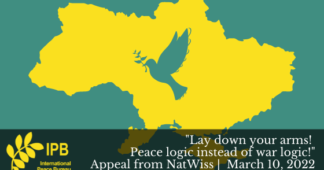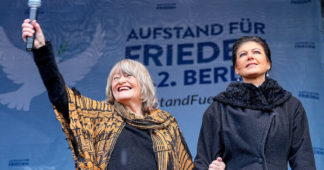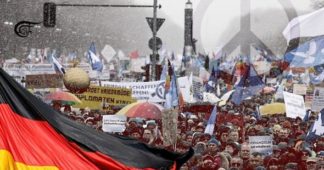Divisions on NATO, Russia and Ukraine inside the German Left
From: jw Issue of 12.04.2023, Page 2 / Domestic
Balance of the Easter marches
“But we want to prevent wars”
Pressure on peace movement grows, demilitarization of politics remains necessary. An interview with Willi van Ooyen
“End wars – win peace” was one of the slogans of the nationwide peace marches over Easter. On Monday, you spoke to this newspaper about “considerably more aggressive defamation in terms of scope and severity,” despite which you succeeded in mobilizing more people. What do you mean by that?
Already since the 1960s and 70s, the peace movement has been accused again and again of working for the other side when it does not join in the war and rearmament propaganda. We are and always have been on the opposite side of the militarists. With the Ukraine war, this confrontation has become sharper, also with personal attacks on activists in the peace movement. The still harmless variant is that we are accused of naivety. We are even accused of being in favor of military support for Russia.
How do you respond when, for example, FDP or CDU politicians make precisely the same accusation and claim that the actions have “at least something naive” in times of war in Ukraine?
They say that because they want to win a war and establish a “victorious peace”. But we want to prevent wars and organize a coexistence of cooperation, détente, confidence-building measures. That is a completely different concept from relying on war as a means of politics.
Recently, the accusation has been systematically circulated that demonstrations of the peace movement are “open to the right”. To your knowledge, were there any such incidents during this year’s Easter marches?
I was not informed of any attempts by right-wingers to make such connections during the Easter demonstrations – if there were any, then at most they were unrecognized. After all, we don’t carry out an identity check. I am also not aware of any media reports that would have claimed this afterwards. All calls nationwide were clear about the peaceful perspective. “Lay down your arms” was a slogan. Speeches at rallies were dominated by a commitment to a cease-fire and peace negotiations. Nowhere, for example, did anyone appear who claimed to be in favor of further military buildup. The rallies were clearly directed against the right-wing trend of SPD, Greens, FDP, CDU and also against the AfD, which all advocate the militarization of society. Against this, the peace movement has set a sign.
The DGB and the Left Party have also accused Easter march organizers in some places of relativizing the role of Russia and not sufficiently distinguishing themselves from the right.
The standard is probably not to distance themselves from social democratic positions. Trade unions thus found it difficult to some extent to keep up their central demands for disarmament: that the arms race not be fueled further and that arms exports not be boosted. The peace movement will continue to use its convincing arguments against creeping acceptance of further militarization.
According to media reports, there is disagreement in the peace movement on the question of whether Germany’s arms deliveries to Ukraine should be stopped. Is that so?
When individuals, in their despair over the war, advocate militarization in self-defense, they must consider that they are thus participating in the widening war, in the dying of people. The majority of the peace movement rejects this.
A frequent argument of the supporters of arms deliveries to Ukraine is: without them, Russia will win the war.
This is not just a war between Russia and Ukraine, but a proxy war with a long reach. The warfare must stop in order to save lives in Ukraine. We need to convince other states that war does not solve political problems. The Gulf wars, the wars in Yugoslavia, Afghanistan and Iraq have only led to greater misery – and precisely not to solving democratic and social problems. Neutrality and demilitarization of politics are necessary. The world is in upheaval. A new peaceful constellation is needed. The advocacy of military options is only fear-mongering by states that want to wage war themselves instead of seeking a negotiated solution.
Translated with www.DeepL.com/Translator (free version)
From: jw Issue of 11.04.2023, Page 4 / Domestic
Peace Movement
Against war propaganda
Despite media defamation, Easter marches well attended in many places. Conflicts between left-wing party and peace movement
By Kristian Stemmler
Their banners read “Peace, heating, bread instead of weapons, war and death,” or “Prevent the third world war!” On the Easter holidays, thousands of people took to the streets in many places from Kiel to Passau for the traditional Easter marches. Willi van Ooyen, spokesman for the Easter March Office, told jW on Monday that “despite the defamations of the peace movement, which were considerably more aggressive in scope and sharpness,” it had not been possible to prevent a stronger mobilization. With more than 120 actions, marches, peace services, bicycle demonstrations and rallies nationwide, the participation had been above that of the previous year. The Easter marchers had not allowed themselves to be distracted by “media-inflated demarcation debates”, but had “clearly taken a stand against the advancing militarization and war propaganda”.
According to organizers, around 2,500 people took part in Berlin alone, around 1,200 in Hanover and several hundred each in Stuttgart, Munich, Cologne, Mainz and Leipzig. In Unterlüß, Lower Saxony, around 80 people demonstrated at the site of the arms manufacturer Rheinmetall. Speakers at the rallies included activists from peace initiatives and organizations, representatives of trade unions and churches, and also from the Left Party and the SPD. The focus of the contributions was the rejection of arms deliveries to Ukraine, the demand for diplomatic initiatives to end the war in Ukraine and a no to the rearmament of the Bundeswehr.
In the call for the three-day Easter March Rhine/Ruhr, for example, it was said that the German government and the EU must seriously strive for “peace negotiations without preconditions.” In Leipzig, co-organizer Torsten Schleip declared, “For us, an immediate ceasefire and the start of negotiations are the better alternative to further arms exports and escalation to the point of a nuclear exchange.” Speeches also called for initiatives by the German government to outlaw and abolish nuclear weapons, uranium munitions and land mines.
In some cities, such as Berlin, there had been disputes in the run-up between the party Die Linke and the classical peace movement. In Hamburg, where the “Forum for International Understanding and Worldwide Disarmament” had called for a demonstration on Easter Monday, the Left Party and the German Federation of Trade Unions (DGB) had not mobilized for the Easter march for the first time. They accused the Forum of relativizing Russia’s responsibility and not sufficiently distancing itself from the right. In Bremen, too, Die Linke distanced itself. State spokesman Christoph Spehr accused the organizers of the Easter march of not showing solidarity with Ukraine. Ekkehard Lentz of the Bremen Peace Forum replied that Spehr was shirking his political responsibility. He did not comment on arms exports to Ukraine and on the danger of “further escalation through the continued advance of NATO to Russia’s borders”.
Left Party and Easter Marches in Germany
Diagnosis of “closeness to Putin“
The Left: Right wing pulls out all the stops to distance itself from Easter march and peace movement. Other comrades hold against it
By Nico Popp (jw 08/04/23)
Conflicts over several prominent Easter marches in various cities show how damaged the relationship between the Left Party and the classical peace movement is after a year of war in Ukraine.
The scene of a special kind of farce is Magdeburg. There, the city executive of Die Linke has distanced itself from the Easter march of the citizens’ initiative “Offene Heide” (Open Heathland), which will take place in Haldensleben on Monday, and has demanded the return of the originally approved 150 euros in support. The accusation: a “strong” or “expected” “proximity to Putin” among the invited speakers, which the city board, in which according to a party member to jW right-wing “anti-Germans” set the tone, wants to have determined. One of the Easter march speakers is the MEP Özlem Demirel. According to information from this newspaper, members of Magdeburg’s Left Party collected money on their own initiative after the decision of the city’s executive committee. The Linke district executive committee Börde continues to support the Easter march.
In Berlin, developments in recent days seemed to amount to an open confrontation: On March 30, the Left Party regional association had scheduled a “peace rally” at short notice with the Berlin VVN-BdA, which was to take place on Easter Sunday evening in close temporal and spatial proximity to the traditional Berlin Easter March. This rally, which party members told jW was obviously intended to be held as an alternative and counter-rally next to the Easter march, was canceled by the state director on Tuesday evening “for organizational reasons”. Instead, there is now an event expressly declared as a counter-rally from the “left-wing Ukrainian solidarity” spectrum, which is agitating for arms deliveries and against demands for a ceasefire. As an event at the Karl-Liebknecht-Haus showed, this manageable scene is openly supported by parts of the Berlin Left leadership.
The background to these maneuvers is that the Berlin Easter March has made itself vulnerable to attack by opening up the organizational alliance to actors from the diffuse spectrum of the Corona protests, which in parts has connections to the far right in terms of personnel and content. The Easter march organizers emphasize that the comrades-in-arms are individuals who have been vetted. Regardless of the political problems involved, this step has proved to be an opportunity for a strong current in Berlin’s Left Party, which no longer wants anything to do with the classic demands and debates of the peace movement and is looking for ways to distance itself from it or to defame it offensively. The accusation that the Easter march as such is “open to the right” – meanwhile even the qualification “decidedly right-wing” is being spread – is almost perfectly suited as a lever for the right wing of the party to draw people to its side who so far have not represented any left-wing positions in the debate about the Ukraine war.
The “overturning” of the Left Party district executive of Berlin-Mitte is an example of this. In February, the district board had still spoken out almost unanimously in favor of supporting the rally at the Brandenburg Gate that followed the “Manifesto for Peace”. However, according to jW information, on 28 March the board rejected official support for this year’s Easter march by eleven votes to seven after a controversial debate with reference to the “participation of right-wing open structures”. In the resolution, however, it is also stated that one “explicitly does not oppose participation in the Easter march”.
Four members of the district executive have criticized the non-support and “defamation” of the Easter march in a statement that is available to jW. In it, they speak of an “attempt to smash the peace movement that is taking place before our eyes.” It continues: “Anti-fascism is a matter of course for us. This does not mean, however, that anyone and everyone who is disappointed by the Corona policy or the ‘peace policy’ of the left may be labeled across-the-board as right-wing or open to the right.”
We remind our readers that publication of articles on our site does not mean that we agree with what is written. Our policy is to publish anything which we consider of interest, so as to assist our readers in forming their opinions. Sometimes we even publish articles with which we totally disagree, since we believe it is important for our readers to be informed on as wide a spectrum of views as possible.











